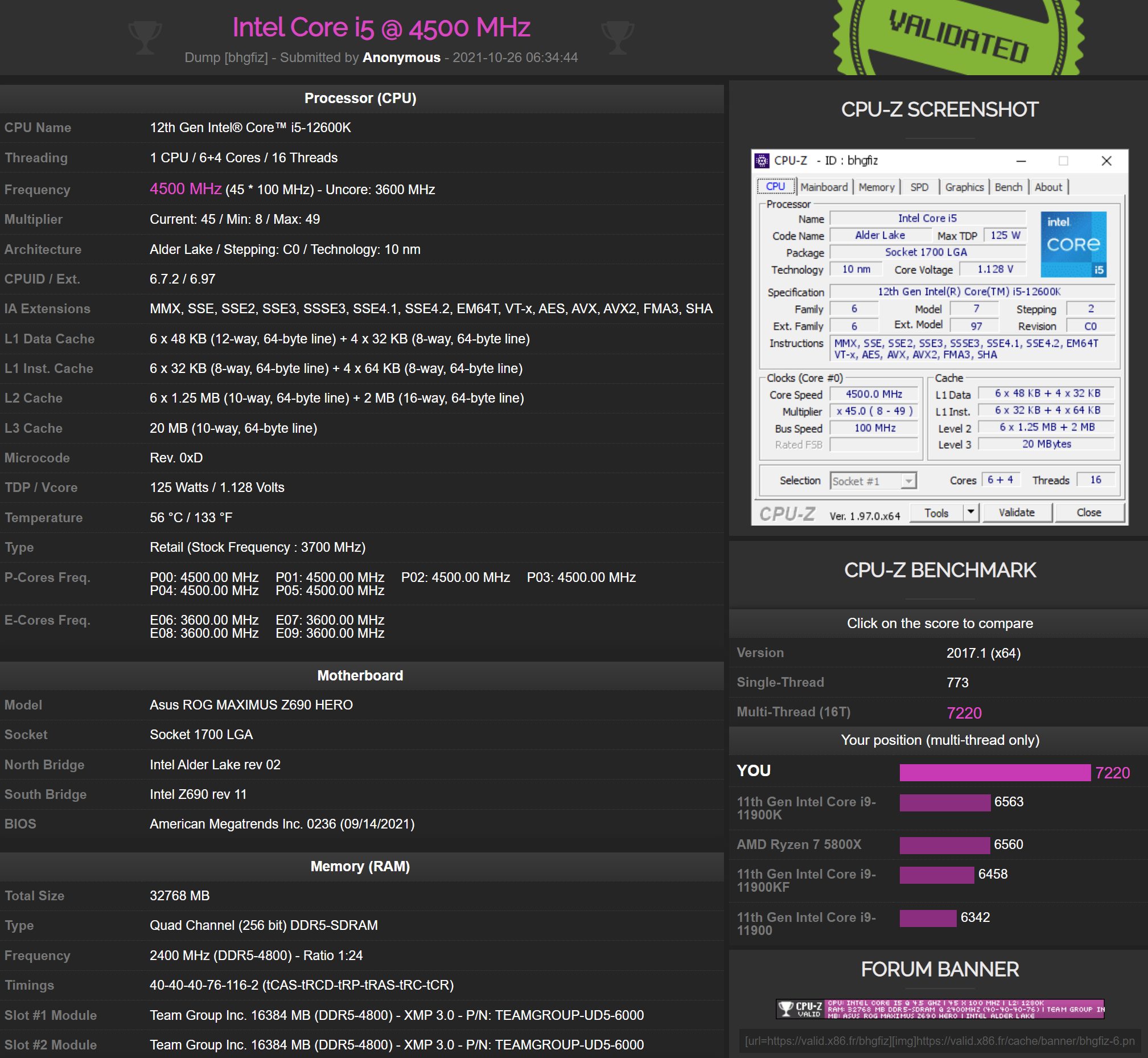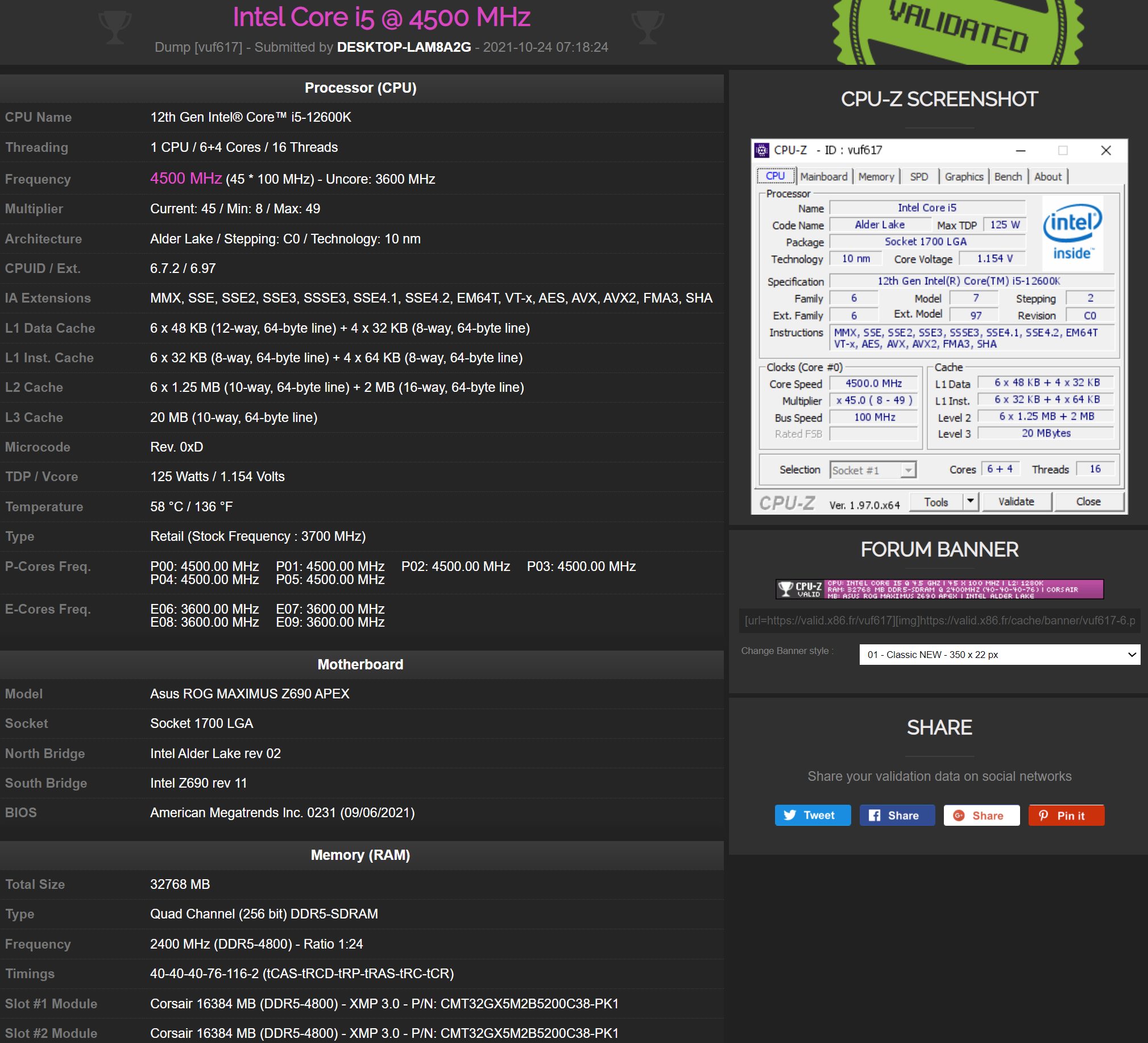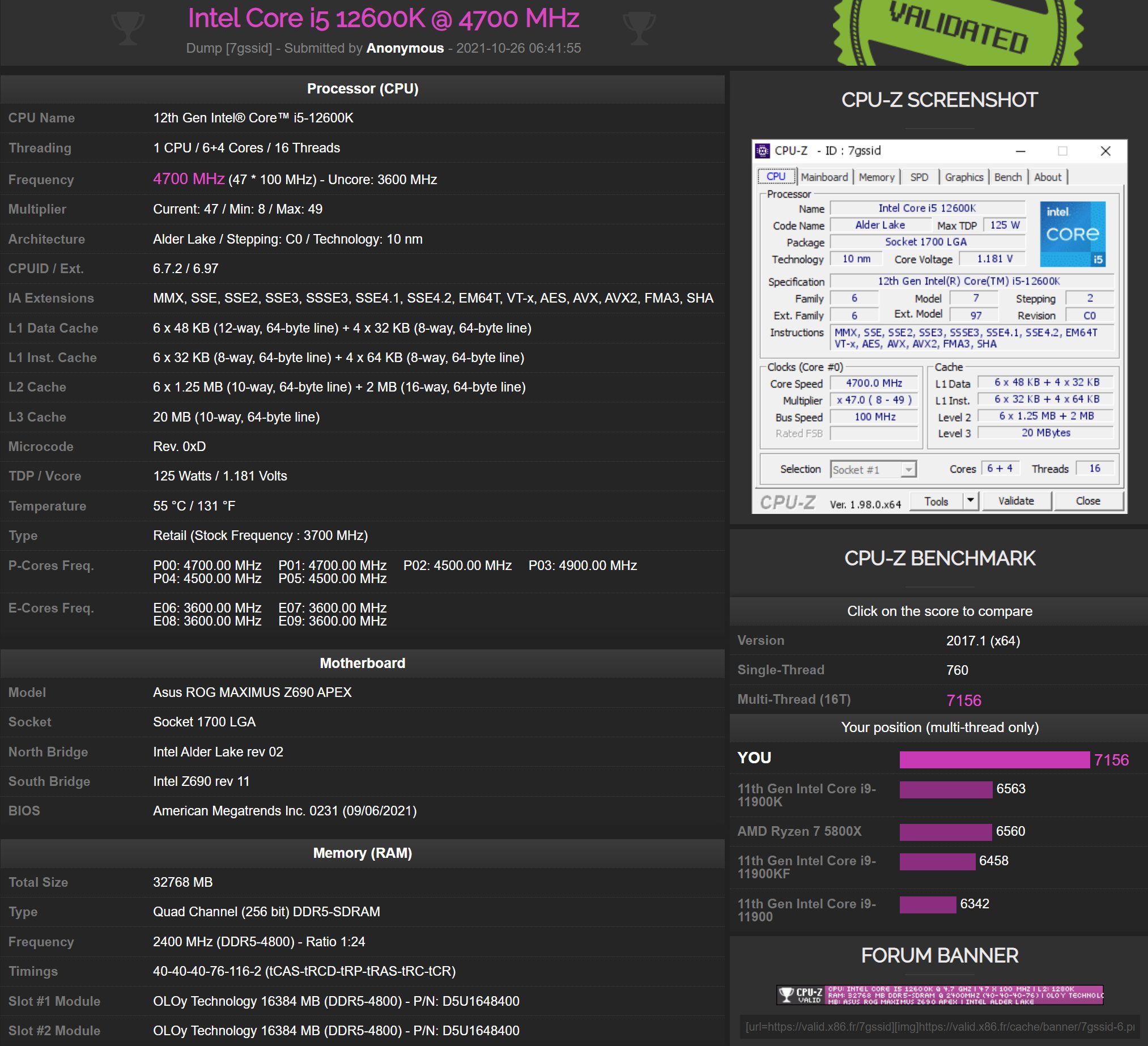Intel Core i5-12600K Test Suggests 50% More Threaded Performance Than 11600K
Alder Lake performance tests hint at a huge jump in threaded performance
As we approach Alder Lake's rumored release on November 4th, performance benchmarks have become increasingly common, pitting Intel's upcoming chip against its own previous generation chips and, of course, AMD's current lineup. If CPU-Z validated benchmark scores are anything to go by, Intel might deliver more than a typical generational update with Alder Lake. For example, a recent leaked benchmark shows that the company's upcoming Core i5-12600K is 50% faster than the previous-gen Core i5-11600K in multi-threaded scenarios.
Three separate validations have been submitted to CPU-Z's database, painting a relatively consistent performance expectation for Intel's historically mid-tier CPU. Two different motherboards were used (one ASUS ROG Maximus Z690 Apex and one ASUS ROG Maximus Z690 Hero), and three different DRAM subsystems (OLOy, Corsair, and TeamGroup), all running at 4800 MT/s. Clocks for the Core i5-12600K are currently rumored at a 2.8 GHz base and 3.7 GHz Boost (6 Performance cores with HyperThreading + 4 Efficiency cores, for a total of 16 available threads), with maximum frequency for single-core Boost at 4.9 GHz.
The Alder Lake Core i5-12600K scored from 760 to 773 points in single-thread (ST) tests and 7,156 to 7,220 points in multi-thread (MT) workloads. Compared to Intel's last generation, the Rocket Lake Core i5-11600K achieves a relatively paltry ~633 ST points (the Core i5-12600K scores 20% higher) and ~4731 MT points (52% advantage for the Core i5-12600K).




Those scores also compare extremely favorably with AMD's current product stack; in terms of threads, the Ryzen 7 5800X (8 cores, 16 threads, $449 MSRP) is the closest competitor offering. However, it's seemingly outclassed by the heterogeneous core design in Alder Lake's 12600K - the Ryzen 7 5800X scores around 640 ST points (the i5-12600K thus provides ~19% higher ST performance) and 6,560 MT points (a 9% performance advantage).
Of course, these results don't paint an overall performance picture for Intel's upcoming Alder Lake family. And yet, we all know that market success stands more on the price/performance ratio of a given part than on its theoretical performance. To that effect, one has to consider that Intel's Core i5-11600K launched to a $262 MSRP. Intel's pricing strategy for Alder Lake and its impressive performance suggestions does remain to be seen; there is an immense price gap between the 11600K's $262 MSRP compared to AMD's Ryzen 7 5800X at $449. AMD does have the advantage of an earlier time to market on its Zen 3 designs, which means that the company can juggle around pricing in order to better compete with Intel's upcoming family.
Get Tom's Hardware's best news and in-depth reviews, straight to your inbox.

Francisco Pires is a freelance news writer for Tom's Hardware with a soft side for quantum computing.
-
-Fran- Oh, this looks amazing if true.Reply
Come on AMD, drop prices so I can upgrade my 3800XT to a 5950X for about $400 :D
Regards. -
TerryLaze Reply
Due to the very high platform price + ddr5 it's very doubtful that AMD will have to drop prices very soon.Yuka said:Oh, this looks amazing if true.
Come on AMD, drop prices so I can upgrade my 3800XT to a 5950X for about $400 :D
Regards.
If and when they will have to drop prices it's not going to be by a lot, they are not going to lose money just to keep selling them, they can't afford to even if they wanted to do that. -
jeremyj_83 Reply
Not to mention that so far we have only seen synthetic benchmarks LEAKS. Before Rocket Lake came out there were tons of leaks saying it was going to be crazy fast. Then it is released and was nothing but a letdown. All those leads in synthetics equated to nothing in real world performance.TerryLaze said:Due to the very high platform price + ddr5 it's very doubtful that AMD will have to drop prices very soon.
If and when they will have to drop prices it's not going to be by a lot, they are not going to lose money just to keep selling them, they can't afford to even if they wanted to do that. -
TerryLaze Reply
Do you mean for laptop/mobile maybe?! Because all the leaks for desktop where like so-so they showed improvement but nothing crazy.jeremyj_83 said:Not to mention that so far we have only seen synthetic benchmarks LEAKS. Before Rocket Lake came out there were tons of leaks saying it was going to be crazy fast. Then it is released and was nothing but a letdown. All those leads in synthetics equated to nothing in real world performance. -
InvalidError "Three separate validations have been submitted to CPU-Z's database, painting a relatively consistent performance expectation for Intel's historically mid-tier CPU. "Reply
The i5-12xxx is still a mid-tier CPU and the only reason a 50% improvement looks good today is because we've had nearly 10 years of relative stagnation eroding people's expectations. 20 years ago, 50% year-on-year performance improvements were normal or even disappointing, not anything to be impressed about. -
jeremyj_83 Reply
Rocket Lake isn't a laptop chip.TerryLaze said:Do you mean for laptop/mobile maybe?! Because all the leaks for desktop where like so-so they showed improvement but nothing crazy. -
Friesiansam When we get proper benchmarks, from known and trustworthy sources and, if they come anywhere near the performance being claimed, then I might sit up and take notice.Reply -
Neilbob ReplyInvalidError said:"Three separate validations have been submitted to CPU-Z's database, painting a relatively consistent performance expectation for Intel's historically mid-tier CPU. "
The i5-12xxx is still a mid-tier CPU and the only reason a 50% improvement looks good today is because we've had nearly 10 years of relative stagnation eroding people's expectations. 20 years ago, 50% year-on-year performance improvements were normal or even disappointing, not anything to be impressed about.
Though to be fair, those improvements were attained in large part thanks to clock speeds that were still very rapidly increasing on a yearly basis. That seems rather less likely these days.